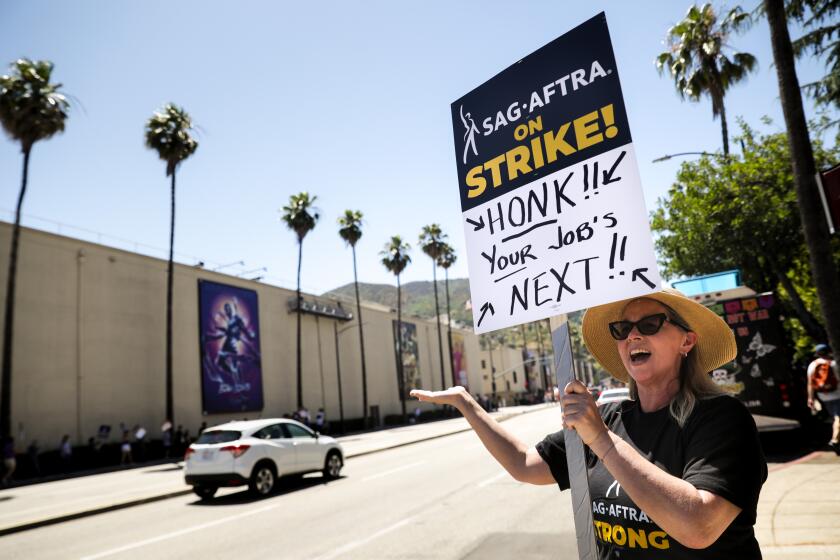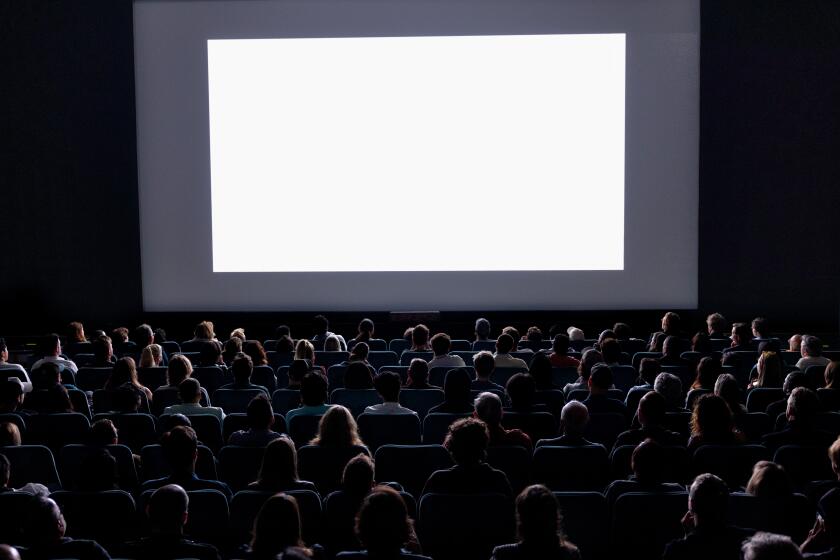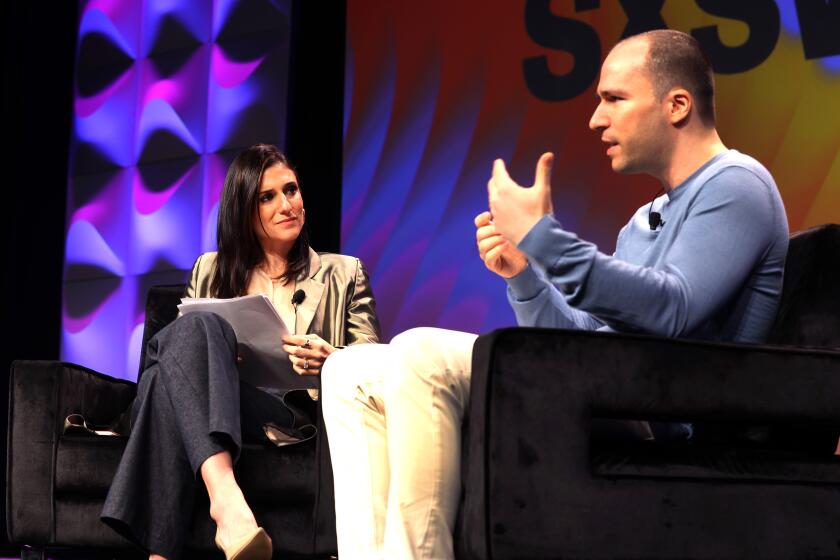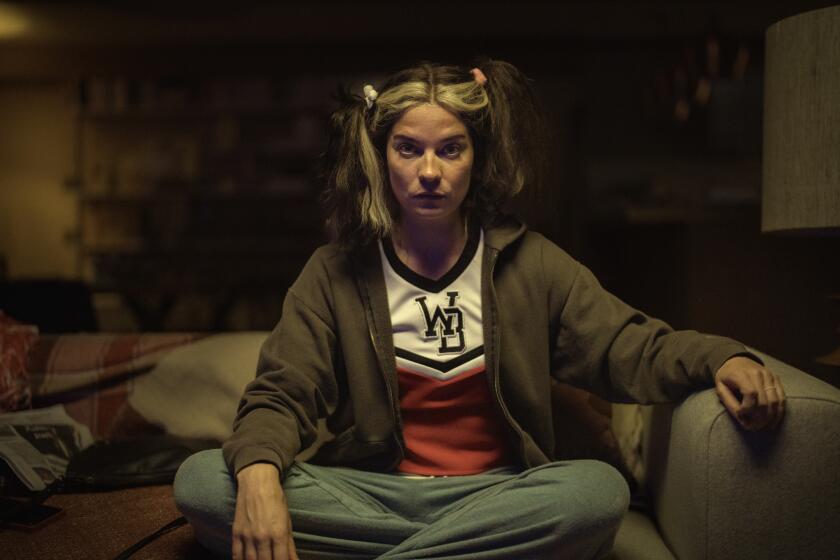Which entertainment jobs are most likely to be disrupted by AI? New study has answers

- Share via
An estimated 62,000 entertainment jobs in California spanning film, TV, music and gaming will be disrupted by the rise of artificial intelligence within the next three years, a new study says.
Published Monday, the report further estimates that 204,000 entertainment jobs across the United States will be affected by AI during the same time frame. A job is considered disrupted when a significant amount of tasks within that role are consolidated, replaced or eliminated as a result of AI, the study explains.
Consulting firm CVL Economics surveyed 300 entertainment-industry leaders — including C-Suite executives, senior executives and mid-level managers and producers — for the study, which analyzes the impact and implications of generative AI usage in the business. The report was commissioned by the Animation Guild, the Concept Art Assn., the Human Artistry Campaign and the National Cartoonists Society Foundation.
After a number of Animation Guild members expressed concerns about the threat of AI, the union intends to use the results of this study to inform its bargaining strategy and goals, said Brandon Jarratt, who serves on the Animation Guild’s executive board and AI task force.
The data is a window into the attitudes and intentions of the most powerful people in the industry when it comes to AI, which Jarratt hopes will prove invaluable — “especially when it comes to shoring up our own contract language around technological change.”
“The tool itself is almost never the issue,” Jarratt said. “The studios are always looking for ways to spend less money. And if they feel like they’re going to be able to cut budgets in order to meet shareholder projections or whatever, then they’re going to try to exploit that in any way they can — and that’s where the fear comes from.”
Concerns about AI are central to the current Writers Guild and SAG-AFTRA strikes, but Americans in other industries also are worried, according to a new poll for the Los Angeles Times.
In Culver City, a gathering of indie filmmakers who used AI software to make short films takes place amid a broader Hollywood reckoning with automation.
In an industry already brought to its knees by the COVID-19 pandemic, overspending during the streaming wars, overlapping labor disputes and mass layoff-inducing corporate mergers, AI is just one more wrench to worry about for entertainment workers.
The growing prevalence of AI has recently emerged as a source of tension in Hollywood, especially during last year’s writers’ and actors’ strikes, which culminated with the WGA and SAG-AFTRA securing limitations and protections surrounding the use of the modern technology in their contracts with the studios.
However, those surveyed expressed less concern about the potential fallout for writers and actors than for other crafts. Adam Fowler, founding partner of CVL Economics, suspects that the gains made by writers and actors in those contracts influenced what kinds of jobs survey participants viewed as susceptible to AI.
“In terms of the specific jobs and roles that we ended up talking about in the report, questions about acting and writing were really much lower overall,” Fowler observed.
According to the study, the job tasks most likely to be impacted by AI in the film and TV industry are 3-D modeling, character and environment design, voice generation and cloning and compositing, followed by sound design, tools programming, script writing, animation and rigging, concept art/visual development and light/texture generation.
About a third of respondents predicted that AI would displace 3-D modelers, sound editors, re-recording mixers and broadcast, audio and video technicians by 2026, while a quarter expected sound designers, compositors and graphic designers to be affected as well. Only 15% flagged storyboard artists, illustrators, animators and look, surface and material artists as vulnerable to AI.
“I was really surprised at the 3-D modeling being so high,” said Nicole Hendrix, co-founder of the Concept Art Assn., who called the results of the study “chilling.”
“There’s obviously so much talk in the news about ChatGPT and programs like Stable Diffusion, so we were expecting to see anything with those platforms the most disrupted,” added Concept Art Assn. co-founder Rachel Meinerding. “It was interesting to see some of these other positions that we thought were maybe a little further away from being displaced be so high up.”
The Times spoke to Nicole Brown of TriStar Pictures; Sam Register of Warner Bros. Animation; Jonathan Glickman of Panoramic Media Co.; Roy Lee of Vertigo Entertainment; FredAnthony Smith of SMAC Entertainment and Chris Hart of United Talent Agency
In the music and sound-recording industry, the tasks most likely to be affected by AI are voice generation and cloning, music generation and recording and lyrics composition, followed by mastering, mixing and tools programming, according to the study.
More than 50% of survey participants anticipated that AI would displace sound designers in the next three years, while more than 40% saw AI coming for music editors, audio technicians and sound engineers. Roughly a third of respondents predicted a similar fate for songwriters, composers and studio engineers.
Meanwhile in the gaming industry, 3-D modeling and concept art/visual developing are the tasks most vulnerable to AI, followed by character and environment design, sound design, tools programming and voice generation and cloning, the report states.
About a third of the industry leaders surveyed said that software developers, sound editors, special effects artists and software analysts and testers were at risk of AI displacement, while 20% thought 3-D artists, game designers, UI/UX designers and video game testers would be displaced.
At SXSW, the annual summit of tech boosters, all eyes turned to A.I. — and, in particular, what the emerging sector means for entertainment.
Overall, the study concludes that entry-level positions in the entertainment industry will be disproportionately impacted by the ascent of AI — a detail that particularly worries Hendrix.
“When you’re looking at any technology that’s essentially replacing [or consolidating] a junior or entry-level role ... it is harming the ecosystem,” she said. “What does that mean if nobody’s really entering in and the bar is now this immovable wall?”
Furthermore, the report identifies 72% of the entertainment companies surveyed as early adopters of generative AI, while 75% of respondents reported that AI had already facilitated the elimination, reduction or consolidation of jobs in their business division.
Actors fear artificial intelligence will replace them. Entertainment lawyers predict the future is more complicated than that.
Though most survey participants noted that AI has also created and will continue to create new job opportunities, it’s unclear whether those new jobs will be accessible to workers displaced by the technology.
“It’s not like the [workers in] roles that are consolidated and lost are going to be automatically eligible for those new roles,” Hendrix explained. “Those are different skill sets. It’s not ... a one-to-one conversion.”
Jarratt, a technical director at Disney Animation, said he isn’t looking to dismiss AI “wholesale.” He believes there are ways that AI can be used to improve working conditions and allow animation staffers to focus on the more rewarding, artistic aspects of their jobs by eliminating some of the more rote tasks, such as manually painting a brick texture on a wall.
Ultimately, Jarratt said the Animation Guild hopes to “help set the industry standard for what kind of tools are appropriate and ... going to help artists, and which ones are going to hurt them and hurt their livelihoods.”
More to Read
Inside the business of entertainment
The Wide Shot brings you news, analysis and insights on everything from streaming wars to production — and what it all means for the future.
You may occasionally receive promotional content from the Los Angeles Times.
















